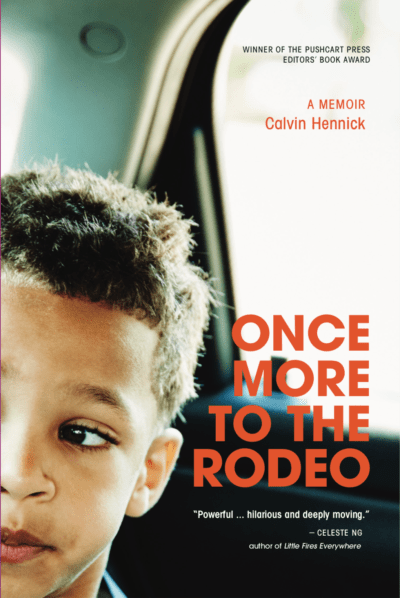Advertisement
Review
Calvin Hennick Takes The Father-Son Relationship On The Road In 'Once More To The Rodeo'

Calvin Hennick wants to teach his son, Nile, lessons he hopes will help him navigate through life successfully: what it means to be a man and the importance of taking care of family. He decides to take Nile on a road trip from their home in the Boston area to Hennick’s tiny hometown of Maxwell, Iowa. Their destination is the town’s rodeo.
Father-son bonding trips have become fairly common, as have the memoirs that have centered on them. Rights of passage are often the catalyst for the trip. In “Backcast: Fatherhood, Fly-fishing, and a River Journey through the Heart of Alaska” and “Any Road Will Take You There,” they address hurt in the face of divorce. In "The Road to Donato: Fathers, Sons, and Cycling across Italy," the son is about to embark on married life.
In the case of Hennick's debut memoir, “Once More to the Rodeo,” son Nile is weeks away from starting kindergarten. Hennick wants to have the important conversations with him before sending him out into the world.
Winner of Pushcart’s 2019 Editor’s Book Award, the memoir is a reflection on the father-son relationship in all of its complexity, messiness and beauty. It is Hennick’s love letter to his son filled with hope, fear and determination.
Hennick does a skillful job of layering his story. He takes the reader on two separate, but parallel journeys: the physical and the emotional. For the physical journey, he builds narrative drive by declaring the 10-day trip and describing what he wants to accomplish within that framework. Each chapter chronicles a day. As one chapter gives way to the next, the book counts down, building tension as it reaches its conclusion.
At moments when the journey could have lost momentum because of the tedium of travel, Hennick keeps the story vibrant, using humor and vivid description, like when the car is inching toward the Canadian border with the checkpoint nowhere in sight:
As we wait, the sun becomes a big yellow ball on the horizon and then dips below it, turning the sky shades of purple and pink, and orange that would be beautiful if viewed from anywhere other than the inside of a Toyota Avalon that has moved approximately thirteen feet in the past forty-five minutes.
While the physical journey propels the story forward, the emotional journey does the interior work, digging underneath the surface. Hennick employs multilayered themes readers can either identify with or be sensitive to. In his raw, unvarnished way, Hennick describes the mixture of emotions he feels when he and Nile reach the house in Iowa where Hennick was raised by an emotionally abusive step-grandmother and a grandfather who eventually abandoned the family:
This is the house where I sat and listened to my grandfather tell me he was moving to Las Vegas. This is where Alice tried to claw the skin off my arms and made me cry for sport. I’m so much happier now. And yet, in this moment, all I want to do is wallow in the past.
Throughout the trip, Hennick wrestles with his feelings for his father, a meth addict he’s been estranged from for decades, and his grandfather. The prospect of Hennick visiting his father while he’s in Iowa creates tension. It becomes clear that the journey is about Nile as much as it is about Hennick. He wants to resolve his feelings toward the father figures in his life to help him be the best father he can be.

There's also the life lesson that Hennick can't teach his son hanging in the balance. He describes his son as "a brown boy in a world where that still very much matters." As a white father, Hennick navigates how to discuss living as a black man in an America in the midst of the Black Lives Matter movement with his son.
As they reach Cooperstown and the Baseball Hall of Fame, Hennick delicately approaches the topic of racism in a way that a 5-year-old can understand, a relatable moment for parents who’ve explained it to their children and the children themselves.
Near the end of the memoir, Hennick says he realizes that the simplified version of racism during the Jackie Robinson era he’s used to explain to his son will not be enough. Hennick chronicles how a fan made a racial slur at him during a Red Sox game he attended with Nile and his father-in-law months after the road trip. The incident receives local news coverage and the fan is banned for life. When Hennick explains to his son what happened, Nile expresses disappointment that it’s not over, that black and white people still aren’t getting along. Heartbroken, Hennick cries when he tells his son it’s not over. It’s never over.
“Once More to the Rodeo” is a memoir about discoveries. Hennick invites the reader along for the ride as he makes discoveries about himself, his son, and his troubled past.
